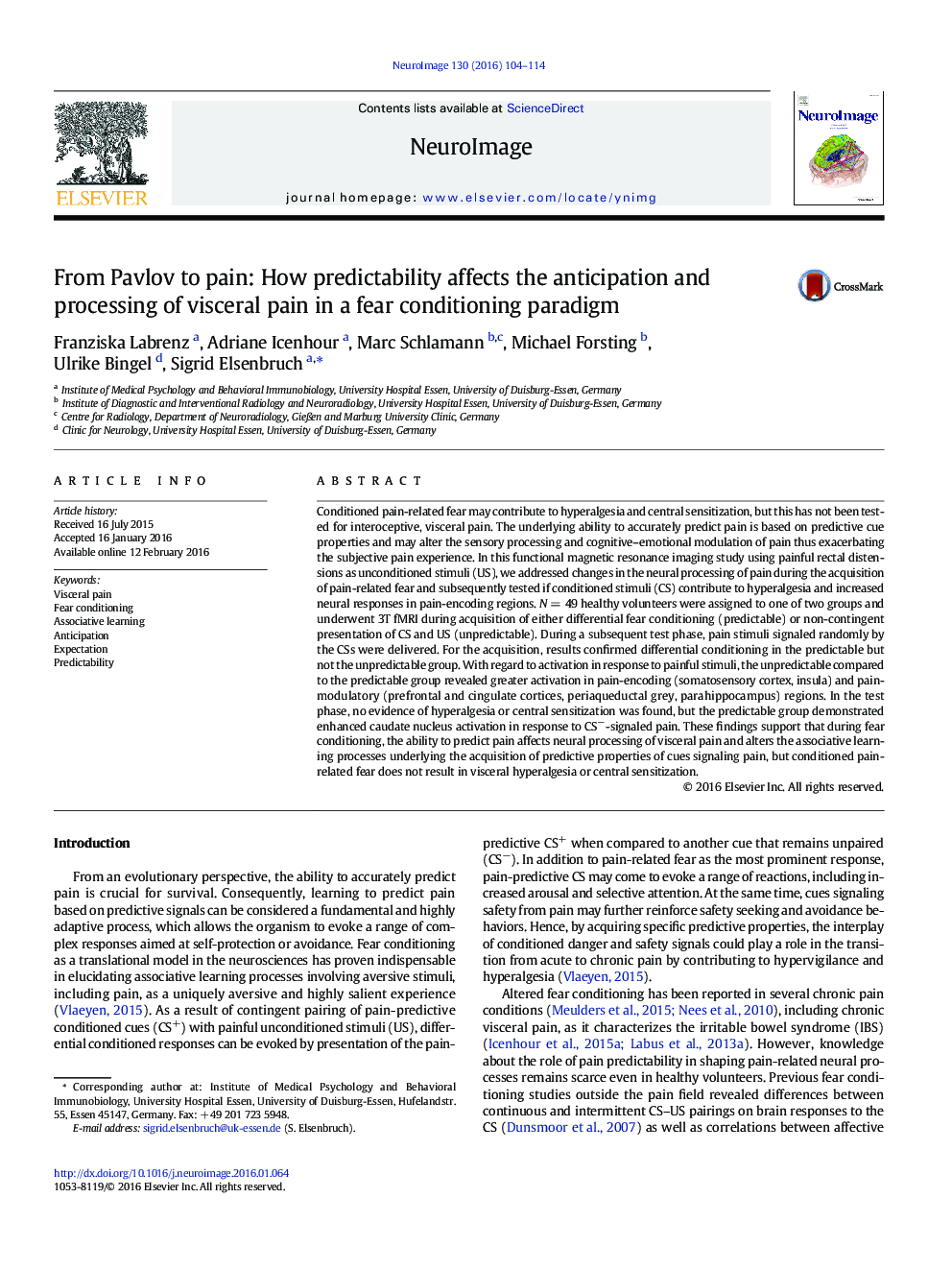| کد مقاله | کد نشریه | سال انتشار | مقاله انگلیسی | نسخه تمام متن |
|---|---|---|---|---|
| 6023659 | 1580878 | 2016 | 11 صفحه PDF | دانلود رایگان |
عنوان انگلیسی مقاله ISI
From Pavlov to pain: How predictability affects the anticipation and processing of visceral pain in a fear conditioning paradigm
ترجمه فارسی عنوان
از پولوف به درد: چگونه پیش بینی و پیشگیری و درمان درد عصبی در یک پارادایم تهدید ترس تاثیر می گذارد
دانلود مقاله + سفارش ترجمه
دانلود مقاله ISI انگلیسی
رایگان برای ایرانیان
کلمات کلیدی
درد احشایی، تهدید ترس، یادگیری وابسته پیش بینی، انتظار، پیش بینی پذیری،
موضوعات مرتبط
علوم زیستی و بیوفناوری
علم عصب شناسی
علوم اعصاب شناختی
چکیده انگلیسی
Conditioned pain-related fear may contribute to hyperalgesia and central sensitization, but this has not been tested for interoceptive, visceral pain. The underlying ability to accurately predict pain is based on predictive cue properties and may alter the sensory processing and cognitive-emotional modulation of pain thus exacerbating the subjective pain experience. In this functional magnetic resonance imaging study using painful rectal distensions as unconditioned stimuli (US), we addressed changes in the neural processing of pain during the acquisition of pain-related fear and subsequently tested if conditioned stimuli (CS) contribute to hyperalgesia and increased neural responses in pain-encoding regions. NÂ =Â 49 healthy volunteers were assigned to one of two groups and underwent 3T fMRI during acquisition of either differential fear conditioning (predictable) or non-contingent presentation of CS and US (unpredictable). During a subsequent test phase, pain stimuli signaled randomly by the CSs were delivered. For the acquisition, results confirmed differential conditioning in the predictable but not the unpredictable group. With regard to activation in response to painful stimuli, the unpredictable compared to the predictable group revealed greater activation in pain-encoding (somatosensory cortex, insula) and pain-modulatory (prefrontal and cingulate cortices, periaqueductal grey, parahippocampus) regions. In the test phase, no evidence of hyperalgesia or central sensitization was found, but the predictable group demonstrated enhanced caudate nucleus activation in response to CSâ-signaled pain. These findings support that during fear conditioning, the ability to predict pain affects neural processing of visceral pain and alters the associative learning processes underlying the acquisition of predictive properties of cues signaling pain, but conditioned pain-related fear does not result in visceral hyperalgesia or central sensitization.
ناشر
Database: Elsevier - ScienceDirect (ساینس دایرکت)
Journal: NeuroImage - Volume 130, 15 April 2016, Pages 104-114
Journal: NeuroImage - Volume 130, 15 April 2016, Pages 104-114
نویسندگان
Franziska Labrenz, Adriane Icenhour, Marc Schlamann, Michael Forsting, Ulrike Bingel, Sigrid Elsenbruch,
